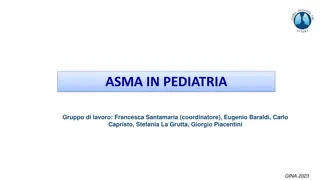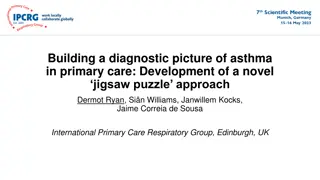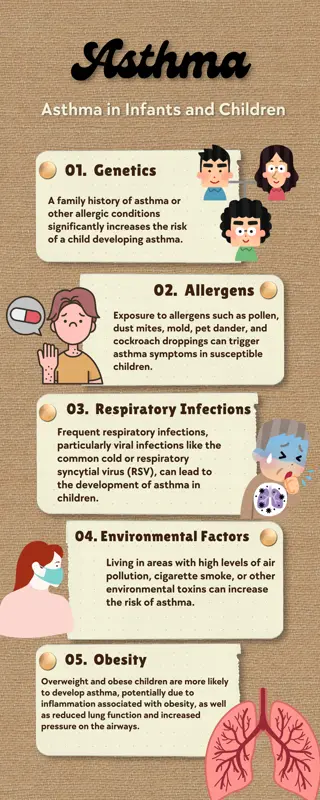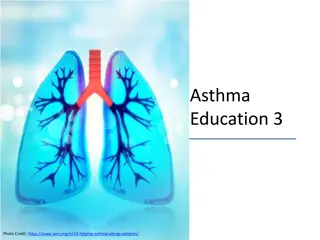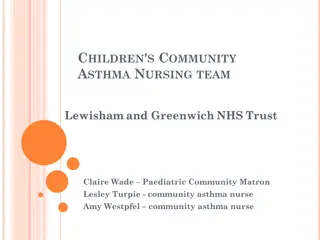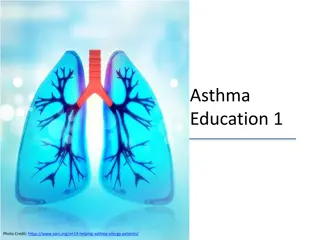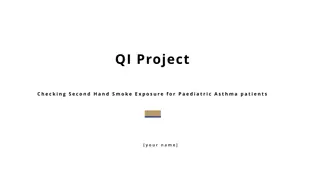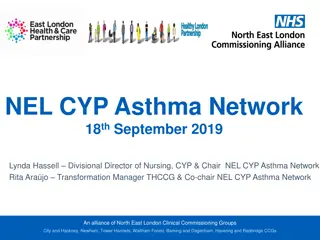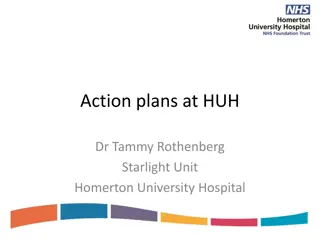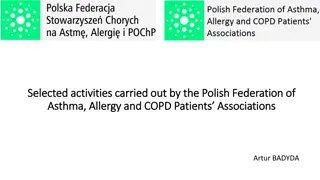Asthma Management
Asthma is a chronic respiratory condition characterized by inflammation and narrowing of the airways, leading to symptoms like wheezing, coughing, shortness of breath, and chest tightness. Triggers vary and can include allergens, exercise, cold air, and stress. Effective management involves avoiding triggers, using prescribed medications (inhalers and oral drugs), and adopting a healthy lifestyle. Creating an asthma action plan with healthcare providers ensures proper response to asthma attacks.
Download Presentation

Please find below an Image/Link to download the presentation.
The content on the website is provided AS IS for your information and personal use only. It may not be sold, licensed, or shared on other websites without obtaining consent from the author.If you encounter any issues during the download, it is possible that the publisher has removed the file from their server.
You are allowed to download the files provided on this website for personal or commercial use, subject to the condition that they are used lawfully. All files are the property of their respective owners.
The content on the website is provided AS IS for your information and personal use only. It may not be sold, licensed, or shared on other websites without obtaining consent from the author.
E N D
Presentation Transcript
Asthma Management Strategies for Patients - Dr Sunny Singhal
Introduction Asthma is a chronic respiratory condition characterized by inflammation and narrowing of the airways, causing difficulty in breathing. Dr. Sunny Singhal, a renowned Asthma Patients Doctor in Jaipur, emphasizes the importance of understanding its causes, which include genetic factors, allergens, and environmental triggers like smoke and pollution. Common symptoms are wheezing, coughing, chest tightness, and shortness of breath. Effective management is crucial for reducing symptoms and preventing asthma attacks. Dr. Singhal advocates that proper asthma control not only minimizes flare-ups but also significantly enhances the quality of life for patients.
Medication and Treatment Options Dr. Sunny Singhal, an esteemed pulmonologist, emphasizes the critical role of medication and treatment options in managing asthma effectively. Long-term control medications such as inhaled corticosteroids and leukotriene modifiers form the cornerstone of asthma management, reducing inflammation and preventing symptoms. Quick-relief medications like short-acting beta agonists provide immediate relief during asthma attacks. Dr. Singhal underscores the importance of proper inhaler use, advising patients on correct techniques for optimal medication delivery. By adhering to prescribed treatments and maintaining open communication with healthcare providers, individuals with asthma can significantly improve their quality of life and minimize the impact of this chronic condition.
Lifestyle and Environmental Control Avoiding asthma triggers is crucial for managing the condition effectively. Identifying personal triggers, such as pollen, dust, or pet dander, helps patients minimize exposure. This involves keeping indoor environments clean, using air purifiers, and avoiding outdoor activities during peak pollen seasons. Additionally, adopting healthy lifestyle choices like regular exercise promotes lung health and reduces asthma severity. A balanced diet rich in fruits, vegetables, and omega-3 fatty acids can also alleviate symptoms. Incorporating stress management techniques, such as deep breathing exercises or yoga, helps mitigate asthma flare-ups triggered by emotional stress. By proactively addressing triggers and embracing a healthy lifestyle, individuals with asthma can improve their quality of life and reduce the frequency of asthma attacks.
Action Plan and Support Resources The action plan outlines specific steps to take during an asthma attack, including using rescue medications and seeking medical help if symptoms worsen. It also emphasizes the importance of proactive measures to prevent attacks, such as avoiding triggers and adhering to prescribed medications. Patients are encouraged to educate themselves with reliable resources and connect with support groups or online communities for additional guidance and encouragement. Regular check-ups and monitoring with Dr. Singhal help track asthma control, adjust treatment plans as needed, and address any concerns promptly. By following an asthma action plan and accessing support resources, patients can effectively manage their condition and lead a healthier life.
Contact details Address: Panchsheel Enclave, 24, Shree __________Vihar, Chandrakala Colony, Jaipur Contact no: 09649790869 Mail id: drsunnysinghal23@gmail.com









